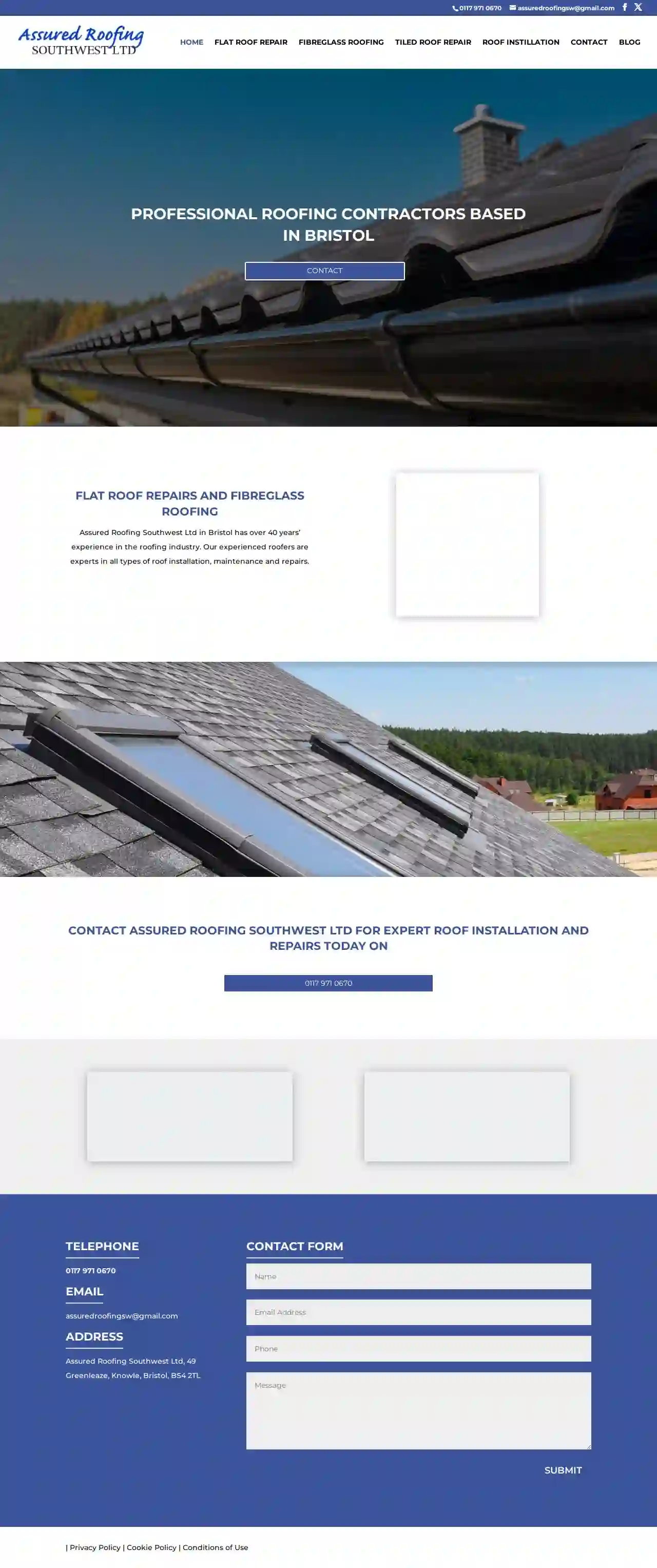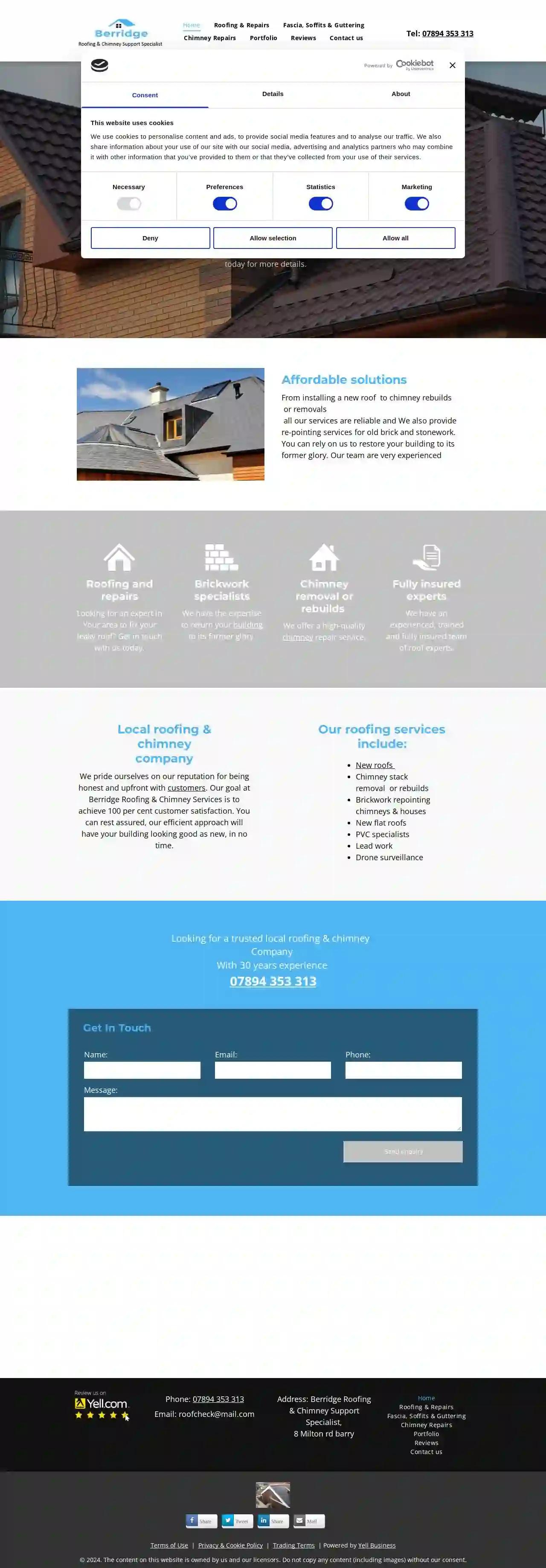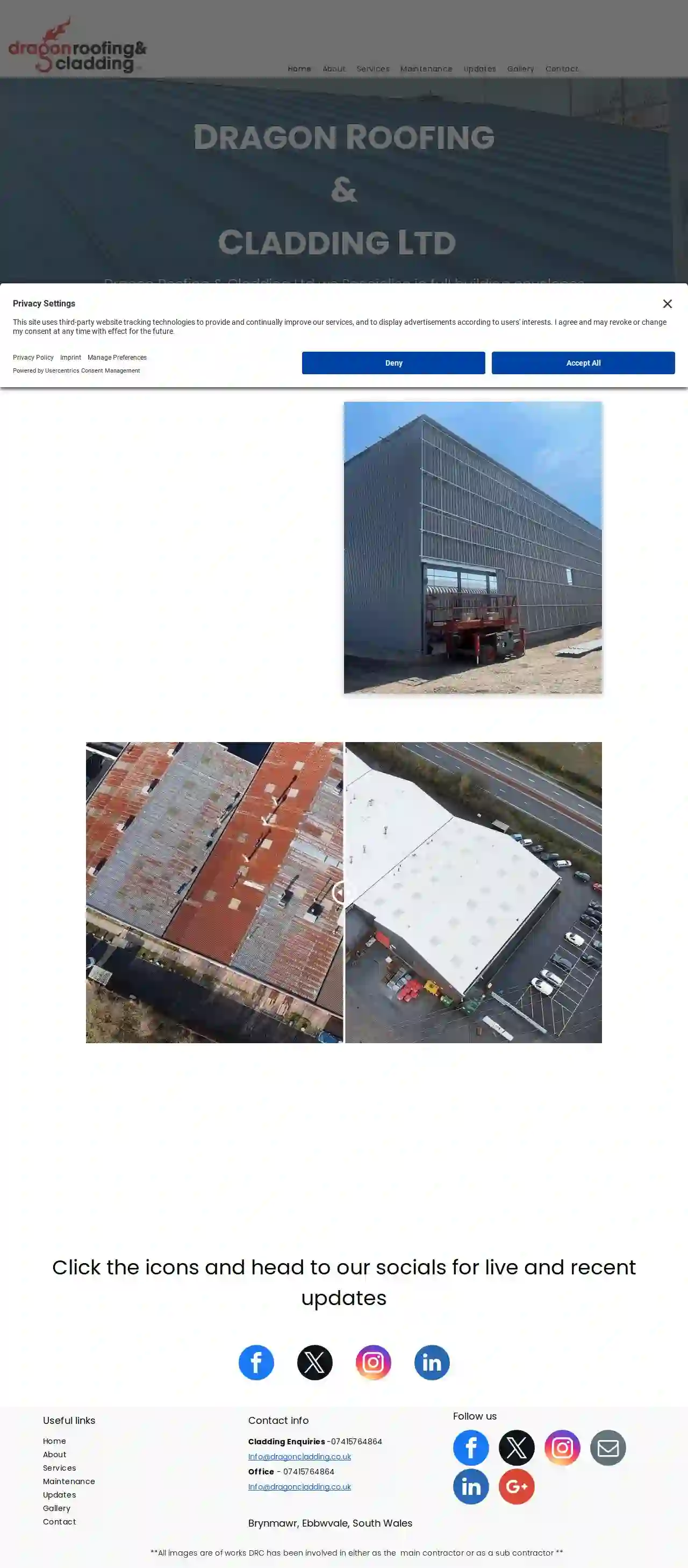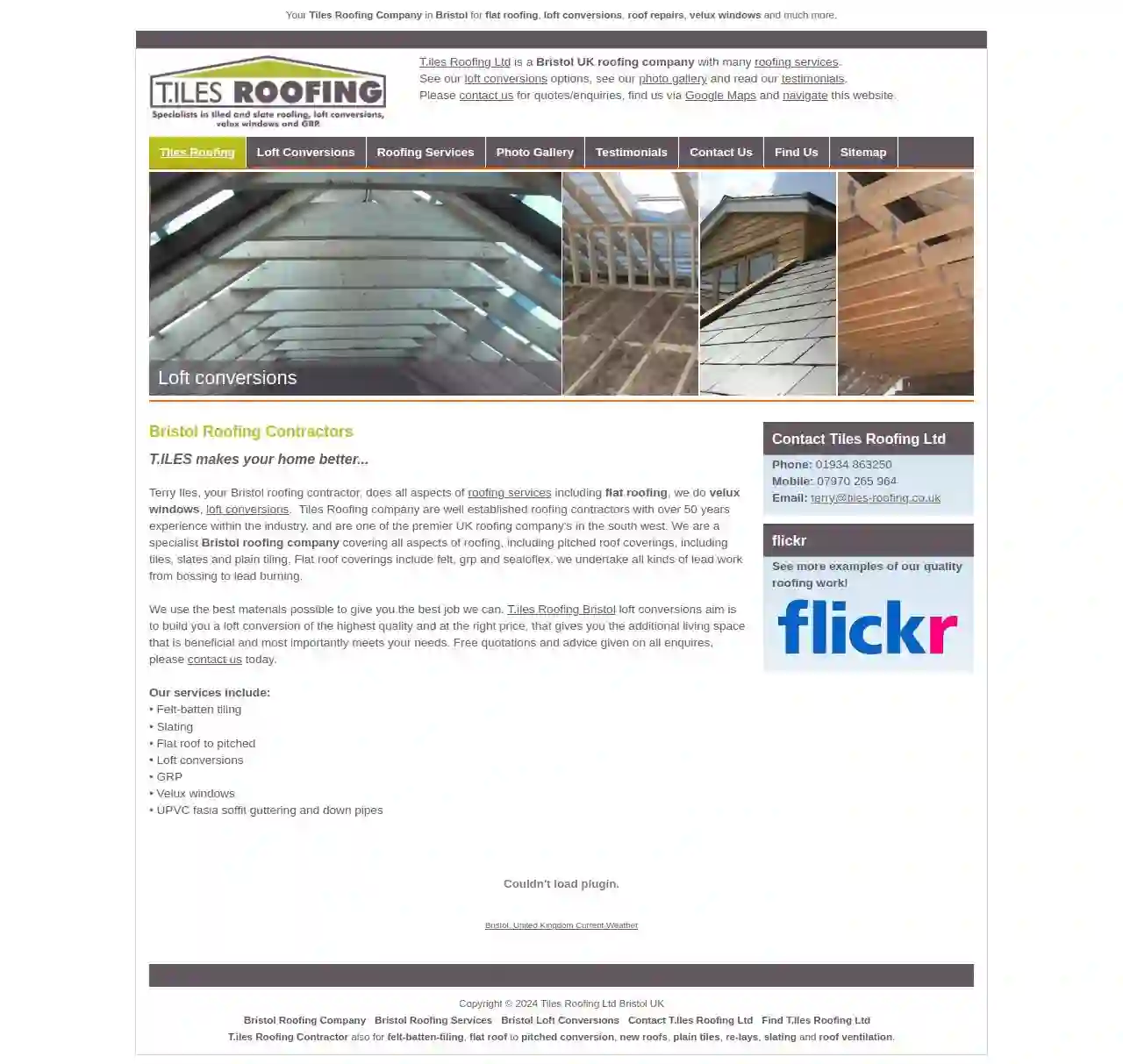Industrial Roofing Contractors Newport
Top 10 Industrial Roofing Contractor in Newport
Receive 3 FREE Industrial Roofing Company quotes for your project today! Compare profiles, reviews, accreditations, portfolio, etc... and choose the best service.

R.S.M Roofing Bristol
4.950 reviewsHarding Road, Stoke Gifford, BS34 8AP, GBR.S.M Roofing deliver top class roofing services, from installing a new roof to replacing broken tiles and slates, across central Bristol and its suburbs in the BS postcode area. As a well-established company with a team of highly experienced roofers in Bristol we are proud to say that we consistently earn five-star reviews from happy customers on Checkatrade and Google, who praise us for high standards of both workmanship and customer service. Our prices are highly competitive, and all our roofing work is guaranteed. No deposit is required and customers can pay on completion.
- Services
- Why Us?
- Accreditations
- Our Team
- Testimonials
- Gallery
Get Quote
Assured Roofing South West Ltd
49 Greenleaze, Knowle, BS4 2TL, GBAssured Roofing Southwest Ltd in Bristol has over 40 years’ experience in the roofing industry. Our experienced roofers are experts in all types of roof installation, maintenance and repairs. We offer a range of services including, flat roofing, pitched roofing, roof slating, roof tiling, chimney repairs, soffits, fascias and gutters. In addition, we are able to carry out high quality loft conversions to help you maximise your space.
- Services
- Why Us?
- Gallery
Get Quote
Berridge Roofing and Chimney Support Specialists
59 reviews8 Milton rd, barry, Barry, CF62 5AA, GBAt Berridge Roofing & Chimney Specialist, our well-trained roofing contractors have over 30 years of experience in the roofing and building maintenance industry. We serve customers across Cardiff and the Vale of Glamorgan. Get in touch with us today for more details. We offer a range of services from installing a new roof to chimney rebuilds or removals, all our services are reliable and we also provide re-pointing services for old brick and stonework. You can rely on us to restore your building to its former glory. Our team are very experienced. Looking for an expert in Your area to fix your leaky roof? Get in touch with us today. We have the expertise to return your building to its former glory. We offer a high-quality chimney repair service. Fully insured experts We have an experienced, trained and fully insured team of roof experts. Local roofing & chimney company We pride ourselves on our reputation for being honest and upfront with customers. Our goal at Berridge Roofing & Chimney Services is to achieve 100 per cent customer satisfaction. You can rest assured, our efficient approach will have your building looking good as new, in no time.
- Services
- Why Us?
- Our Team
- Testimonials
- Gallery
Get Quote
Duraseal Roofing
51 reviewsRhondda, GBDuraseal provide a large range of roofing services including roof design, construction, and repair services to domestic and commercial customers throughout South Wales. From new builds and house extensions to offices and factories, we can work on properties of all shapes and sizes. Our team work with a variety of materials and we’re known for our high quality work and professionalism. For more information on our services, give us a call today.
- Services
- Why Us?
- Testimonials
- Gallery
Get Quote
Dragon Roofing & Cladding Ltd
44 reviewsGBDRAGON ROOFING & CLADDING LTD is a leading industrial cladding and façade specialist based in South Wales, serving clients throughout the UK. We specialize in all aspects of industrial roofing and cladding, carrying out projects of varying scales, from routine maintenance and repair to major commercial and industrial projects. We pride ourselves on our commitment to quality, safety, and customer satisfaction. Our team of experts holds appropriate certificates and insurances, ensuring all projects are completed to the highest standards and adhere to all health and safety regulations. We work closely with contractors and architects to design and deliver high-quality projects for their clients. We are dedicated to providing a service that reflects our traditional values and extensive experience, combined with innovative and forward-thinking solutions.
- Services
- Why Us?
- Gallery
Get Quote
Monmouth Roofing&Cladding
GBA family run business with over 20 years experience in the industry, we specialise in the design,fitting and maintenance of various roofing and cladding products. We also install a wide range of rain screen systems. Based in South Wales we are able to cover an extensive area of the UK. Rejuvenate your building Using the latest and more traditional cladding products on the market, we can give any building a new lease of life and an extended period of usability. Tired and rusty industrial units, commercial properties, shopfronts and residential buildings can all be improved by our skilled teams. Maintain We offer extensive maintenance services tailored to your businesses individual needs. Including: Roof cleaning and repair. Leak locating and repair. Gutter cleaning and repair. Blocked or damaged rainwater outlets. Damaged cladding replaced or repaired. Soffits and facias. Exsisting cladding cleaned. Old ducting and flues removed.
- Services
- Why Us?
- Gallery
Get Quote
AJH Roofing Ltd
4.637 reviewsGBAJH Roofing Ltd is a highly reputable roofing company based in Bristol, established since 1982. We pride ourselves on offering a wide range of roofing services at competitive prices, ensuring your home receives the best possible care. Our City & Guilds qualified team boasts years of experience in all aspects of roofing, handling projects big and small with equal expertise. We are committed to providing a professional, honest, and reliable service every time, guaranteeing all our work. Our services extend to roof tiling, flat roofing, fascias, soffits, guttering, roof repairs, and much more. For your convenience, we are available six days a week and offer free quotes.
- Services
- Why Us?
- Gallery
Get Quote
Roofer Bristol
Bristol, GBAt Brunel Roofing & Property Services, we are your go-to team of roofers in Bristol. With years of experience within the industry, we can provide you with a range of different roofing installations and repair services. We are a family run business dating back three generations that have passed on traditional roofing methods as well as ensuring we have developed with the industry to benefit from the latest innovations. For you, this means you will receive the best of both worlds, a quality and thorough job as well as an efficient service. For your complete peace of mind, we also provide all of our customers with a quality guarantee. This means, that if there the work we provide is fully protected. Our roofers in Bristol will do whatever they can to ensure you are 100% satisfied with the project completion.
- Services
- Why Us?
- Gallery
Get Quote
Avoncraft Roofing Services Bristol
515 reviewsBristol, GBAvoncraft Roofing Services is a reputable roofing company in Bristol, providing a wide range of roofing services to both residential and commercial properties. With many years of experience, our team of expert roofers is dedicated to delivering high-quality services that meet the unique needs of each client. From new roof installations to repairs and maintenance, we offer a comprehensive range of solutions to ensure your roof is always in good condition. Our services include flat roofing, garage roof replacement, tiling and slating, leadwork specialists, and more. We pride ourselves on our excellent communication, efficient workmanship, and competitive pricing. Whether you're looking for a free quote or need emergency repairs, our team is here to help. Contact us today to learn more about our services and how we can help you with your roofing needs.
- Services
- Why Us?
- Testimonials
- Gallery
Get Quote
T.Iles Roofing Ltd
51 reviewsThe Cottages, Redhill, 4 Redcroft, Bristol, BS40 5SL, GBT.ILES Roofing Ltd is a Bristol UK roofing company with many roofing services. We are a specialist Bristol roofing company covering all aspects of roofing, including pitched roof coverings, including tiles, slates and plain tiling. Flat roof coverings include felt, grp and sealoflex. we undertake all kinds of lead work from bossing to lead burning.We use the best materials possible to give you the best job we can. T.iles Roofing Bristol loft conversions aim is to build you a loft conversion of the highest quality and at the right price, that gives you the additional living space that is beneficial and most importantly meets your needs. Free quotations and advice given on all enquires, please contact us today.
- Services
- Why Us?
- Our Team
- Testimonials
- Gallery
Get Quote
Over 12,314+ Roofing Companies on our platform
Our roofing pros operate in Newport and surroundings!
Roofyng.co.uk has curated and vetted Top Roofing Contractors near Newport. Find a trustworthy contractor today.
Industrial Roofing FAQs
- Reduced Energy Costs: Lower cooling loads reduce energy consumption and operating costs for air conditioning.
- Improved Indoor Comfort: Keeps the building cooler, enhancing worker comfort and productivity.
- Extended Roof Lifespan: Reduces heat stress on roofing materials, extending their lifespan.
- Environmental Benefits: Decreased energy demand lowers greenhouse gas emissions and reduces the urban heat island effect.
- The existing roof deck is damaged or deteriorated.
- The existing roofing system has multiple layers.
- There are significant structural issues with the roof.
- A roof overlay (recover) is not permitted by local building codes.
How often should an industrial roof be inspected?
What are the benefits of a cool roof for my industrial building?
How do I find a reputable industrial roofing contractor?
What is a roof tear-off, and when is it necessary for industrial roofing?
How often should an industrial roof be inspected?
What are the benefits of a cool roof for my industrial building?
- Reduced Energy Costs: Lower cooling loads reduce energy consumption and operating costs for air conditioning.
- Improved Indoor Comfort: Keeps the building cooler, enhancing worker comfort and productivity.
- Extended Roof Lifespan: Reduces heat stress on roofing materials, extending their lifespan.
- Environmental Benefits: Decreased energy demand lowers greenhouse gas emissions and reduces the urban heat island effect.
How do I find a reputable industrial roofing contractor?
What is a roof tear-off, and when is it necessary for industrial roofing?
- The existing roof deck is damaged or deteriorated.
- The existing roofing system has multiple layers.
- There are significant structural issues with the roof.
- A roof overlay (recover) is not permitted by local building codes.